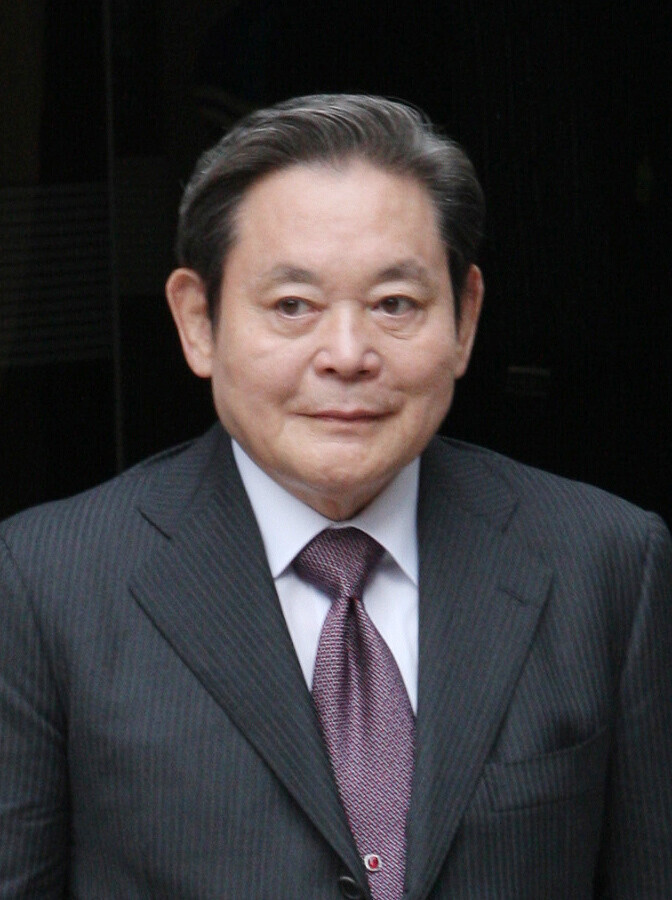hankyoreh
Links to other country sites 다른 나라 사이트 링크
Samsung Chairman Lee Kun-hee passes away at age 78

Samsung Electronics Chairman Lee Kun-hee passed away on Oct. 25 at Samsung Medical Center in Seoul’s Irwon neighborhood. His death comes six years and five years after he suffered an acute myocardial infarction at his Itaewon home in May 2014. He was 78.
In a press release that morning, Samsung said, “In honor of the wishes of the deceased and his surviving family, simple family funeral services are to be conducted. Condolence visits and flowers are to be respectfully declined.” Lee’s family members, including wife Hong Ra-hee and son and Lee Jae-yong, Samsung Electronics vice chairman, were present with him in his final moments after being notified the day before that he was in critical condition, sources reported. His time of death was reported as 3:59 am. A wake was held at Samsung Medical Center.
In 1987, Lee Kun-hee succeeded his father Lee Byung-chull to become the second head of the Samsung Group. Whereas the former chairman had adopted a growth strategy focused on the domestic business environment, Lee Kun-hee is seen as having developed Samsung into a global business. His 1993 “new management declaration” in Frankfurt -- where he announced a “quality first” approach calling for “changing everything but the wife and kids” -- is seen as the big turning point in Samsung’s stratospheric growth. The company currently ranks first in the world in the semiconductor, display, mobile phone, and television markets.
According to Fair Trade Commission (FTC) figures, the Samsung Group had total assets (fair value) amounting to 425 trillion won (US$376.42 billion) as of late 2019, representing growth of more than six times in the last 20 years alone. In terms of scale, it is nearly double the 235 trillion won (US$208.14 billion) recorded by the number two-ranked Hyundai Motor Group. On this basis, Lee long served as a “centripetal point” for the South Korean business world -- which could whip into a storm with a single world. The calls for a “young organization” and “future sustenance” that he put forth after returning to management in 2010 ushered in changes not just for Samsung but for South Korean business in general.
Lee also locked horns with then Prime Minister Chung Un-chan in 2011 over ideas for a surplus profit sharing system, declaring, “I don’t know if that’s a socialist term or a communist one, but I’ve never heard of such a thing.” In a statement on Oct. 25, the Korea Enterprises Foundation (KEF) remembered Lee as having “offered a direction for the South Korean economy at every moment of crisis with his risk-taking spirit and strong leadership.”
Unresolved issues of Samsung’s governance structureLee passed away without having fully resolved issues concerning Samsung’s governance structure. The ruling family’s control of the conglomerate currently remains unstable within a framework that has Samsung C&T at its apex, with Samsung Life and Samsung Electronics as key links. The illegal Samsung C&T/Cheil Industries merger that has left Lee Jae-yong facing prosecutors’ investigations and courtroom battles for nearly three years now arose out of the process of the Lee clan trying to secure its control over the group, as did the alleged accounting fraud at Samsung Biologics.
The business community and markets are predicting the Samsung governance structure could be in for a rocky road depending on how Lee’s shares in major affiliates such as Samsung C&T and Samsung Life are divided among his next of kin. A high-ranking Samsung executive said, “Chairman Lee’s plans for distributing his assets are believed to be stipulated in his will.”
By Song Chae Kyung-hwa
Please direct comments or questions to [english@hani.co.kr]
Editorial・opinion
![[Column] Season 2 of special prosecutor probe may be coming to Korea soon [Column] Season 2 of special prosecutor probe may be coming to Korea soon](https://flexible.img.hani.co.kr/flexible/normal/500/300/imgdb/original/2024/0426/3317141030699447.jpg) [Column] Season 2 of special prosecutor probe may be coming to Korea soon
[Column] Season 2 of special prosecutor probe may be coming to Korea soon![[Column] Park Geun-hye déjà vu in Yoon Suk-yeol [Column] Park Geun-hye déjà vu in Yoon Suk-yeol](https://flexible.img.hani.co.kr/flexible/normal/500/300/imgdb/original/2024/0424/651713945113788.jpg) [Column] Park Geun-hye déjà vu in Yoon Suk-yeol
[Column] Park Geun-hye déjà vu in Yoon Suk-yeol- [Editorial] New weight of N. Korea’s nuclear threats makes dialogue all the more urgent
- [Guest essay] The real reason Korea’s new right wants to dub Rhee a founding father
- [Column] ‘Choson’: Is it time we start referring to N. Korea in its own terms?
- [Editorial] Japan’s rewriting of history with Korea has gone too far
- [Column] The president’s questionable capacity for dialogue
- [Column] Are chaebol firms just pizza pies for families to divvy up as they please?
- [Column] Has Korea, too, crossed the Rubicon on China?
- [Correspondent’s column] In Japan’s alliance with US, echoes of its past alliances with UK
Most viewed articles
- 1‘We must say no’: Seoul defense chief on Korean, USFK involvement in hypothetical Taiwan crisis
- 2Why Kim Jong-un is scrapping the term ‘Day of the Sun’ and toning down fanfare for predecessors
- 3After election rout, Yoon’s left with 3 choices for dealing with the opposition
- 4Two factors that’ll decide if Korea’s economy keeps on its upward trend
- 5BTS says it wants to continue to “speak out against anti-Asian hate”
- 6Gangnam murderer says he killed “because women have always ignored me”
- 7South Korea officially an aged society just 17 years after becoming aging society
- 8[Column] Park Geun-hye déjà vu in Yoon Suk-yeol
- 9Division commander ordered troops to enter raging flood waters before Marine died, survivor says
- 10No good, very bad game for Korea puts it out of Olympics for first time since 1988